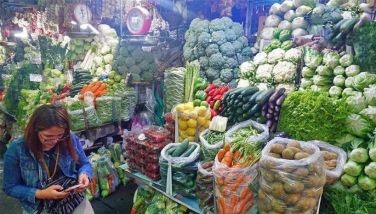RP thwarts EC on tighter rules on fish products
April 22, 2003 | 12:00am
The Philippines was able to thwart the bid of some members of the European Community (EC) to lower the maximum level (ML) for lead content in marine products that would have made it difficult for the country to continue exporting its fish and fishery products to Europe.
The country’s representatives to the 35th session of The Netherlands-based Codex Committee on Food Additives and Contaminants (CCFAC) successfully blocked the EC proposal to impose a new ML for lead content on fish, marine and aquaculture products to 0.2 parts per million (ppm). The Philippines was pushing instead, to maintain the current ML of lead at 0.4 to 0.5 ppm.
Dr. Alicia Lustre, chairperson of the National Agricultural and Fishery Council Codex sub-committee who led the Philippine delegation to Tanzania last month, reported that "the country has prevented the final adoption of a tiered approach to the establishment of an ML for lead in fish."
Lustre added that the Philippine position also gained strong support from other countries as China, India, Japan and Korea which stated strongly that an ML of 0.2 ppm was too low and will make it virtually impossible for them to comply with.
CCFAC is one of the committees of the Codex Alimentarius Commission (CAC), a working group collaborating with the World Health Organization/Food and Agriculture Organization to come up with international food standards and guidelines.
The EC’s proposed two-tiered approach essentially calls for the setting up of two categories for fish and fishery products trading – one involves a list of traded fish complying with the maximum lead content of 0.2 ppm and the other involves a list of fish species with a level of 0.4 ppm.
Lustre argued that this approach will effectively prevent exports from the Philippines and other developing countries.
In her report, Lustre said that "a short positive list with corresponding levels could actually create barriers to trade for those species excluded from the list. We expressed preference for one level that was practically achievable, and we proposed 0.5 ppm."
The Philippine delegation insisted that before new ML standards are set, risk assessment studies should first be conducted.
Earlier, Agriculture Secretary Luis Lorenzo Jr. urged David Byron, head of the Codex secretariat to discontinue work on a proposed ML for the lead in fish as current risk assessment and other information indicates there is no basis to do so from the point of view of risk to human health and problems in trade.
Lustre added that there is no internationally validated method of lead in fish that can analyze for lead at the proposed ML in a normal product control laboratory.
The Philippines noted that establishing a 0.2 ppm ML for lead in fish and other marine products contradicts existing Codex provisions which specify that setting up MLs should be confined only to contaminants known to present significant risks to public health.
Lustre also cited other Codex principles which states that the setting up of an ML is possible if there is adequate information on known expected problems in trade and data on relationship between lead exposure through fish consumption and health risks. – Rocel Felix
The country’s representatives to the 35th session of The Netherlands-based Codex Committee on Food Additives and Contaminants (CCFAC) successfully blocked the EC proposal to impose a new ML for lead content on fish, marine and aquaculture products to 0.2 parts per million (ppm). The Philippines was pushing instead, to maintain the current ML of lead at 0.4 to 0.5 ppm.
Dr. Alicia Lustre, chairperson of the National Agricultural and Fishery Council Codex sub-committee who led the Philippine delegation to Tanzania last month, reported that "the country has prevented the final adoption of a tiered approach to the establishment of an ML for lead in fish."
Lustre added that the Philippine position also gained strong support from other countries as China, India, Japan and Korea which stated strongly that an ML of 0.2 ppm was too low and will make it virtually impossible for them to comply with.
CCFAC is one of the committees of the Codex Alimentarius Commission (CAC), a working group collaborating with the World Health Organization/Food and Agriculture Organization to come up with international food standards and guidelines.
The EC’s proposed two-tiered approach essentially calls for the setting up of two categories for fish and fishery products trading – one involves a list of traded fish complying with the maximum lead content of 0.2 ppm and the other involves a list of fish species with a level of 0.4 ppm.
Lustre argued that this approach will effectively prevent exports from the Philippines and other developing countries.
In her report, Lustre said that "a short positive list with corresponding levels could actually create barriers to trade for those species excluded from the list. We expressed preference for one level that was practically achievable, and we proposed 0.5 ppm."
The Philippine delegation insisted that before new ML standards are set, risk assessment studies should first be conducted.
Earlier, Agriculture Secretary Luis Lorenzo Jr. urged David Byron, head of the Codex secretariat to discontinue work on a proposed ML for the lead in fish as current risk assessment and other information indicates there is no basis to do so from the point of view of risk to human health and problems in trade.
Lustre added that there is no internationally validated method of lead in fish that can analyze for lead at the proposed ML in a normal product control laboratory.
The Philippines noted that establishing a 0.2 ppm ML for lead in fish and other marine products contradicts existing Codex provisions which specify that setting up MLs should be confined only to contaminants known to present significant risks to public health.
Lustre also cited other Codex principles which states that the setting up of an ML is possible if there is adequate information on known expected problems in trade and data on relationship between lead exposure through fish consumption and health risks. – Rocel Felix
BrandSpace Articles
<
>
- Latest
- Trending
Trending
Latest
Trending
Latest
Recommended




























